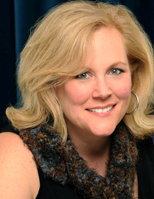This past weekend, I attended a workshop called "Earning Your Worth, A One Day Workshop for Women" led by personal finance consultant, Lisa Gould. Eight women from varied backgrounds and income brackets came together searching for ways to improve their earning power. Among us was a highly successful life coach making upwards of $300,000 a year, a stay-at-home mom who's also a writer and a bartender working at a high-end Beverly Hills establishment and making a good living. All in all, it was quite a diverse group.
There are many workshops available to women on this topic and yet, this one was unique. Lisa Gould not only delves into why we don't ask for what we're worth, she shows us how to plan for our future and factor our potential into our worth. The common belief seems to be that to determine what to charge, we must find out what our competitors are charging and then pick a number that feels right. The truth is, there's much more involved.
First we had to learn what underearning really is. According to Lisa, "underearning is the pattern of earning less money than you need, or than is beneficial, despite your desire to do otherwise." She explains that if you choose to live a simple life, let's say working as a waitress, or working for a company in the same position without wanting to be promoted, there's nothing wrong with that. It's a conscious choice. However, if you are living below your potential and you want or desire more, then you're underearning.
What if you're working for someone else and you don't charge for your services hourly? "57% of men negotiate their first salary with a company and only 7% of women do", Lisa told us, explaining that this is how women start down the path of under earning. "Women leave somewhere around $500,000 on the table by the time they're 60 simply by not negotiating an equitable first salary," she said. We were shocked.
It's important to understand your personal relationship with money and the beliefs that were handed down to you about money. It's even more important to pull your head out of the sand and become aware of your options and choices. You have to determine what your "income earning ceiling" is. This is the number you feel comfortable with based on your needs, the kind of future you want to have, how much you want to give back and how hard you believe you'll have to work to achieve that number. We were guided through a process as we determined our own personal number without the influence of outside factors, such as what the competition is earning.
Lisa helped us to dispel some common beliefs we were raised with such as "I'll always be taken care of by ..." Fill in the blank: is it your dad, your husband or your inheritance? She makes it clear that we can include this in our planning, but to remember that there are no sure things. We can't know what factors will be in play at any given time. You can't be sure interest rates will stay the same or whether real estate prices will be high or low. There are many factors to consider, including your health and the health of your spouse and family. There is no way to predict when you might have to take care of an ill relative. In other words, be prepared. Don't assume the worst will happen, but it is important to be aware and to include different possibilities in your plan.
Here are five examples that may indicate you are underearning:
1.Failing to ask for a raise or raising your fees to keep up with the cost of living.
2.Giving away more time than you charge for.
3.No IRA or 401k or any reasonable plan for retirement.
4.Unequal bartering.
5.Not having a career plan.
Lisa's motto is "Getting by isn't." Once you gain financial clarity you'll be in a better position to make educated decisions as to how much is enough for you.
What you earn is personal. It isn't about how much you earn, it's how empowered you are while you're earning it!
